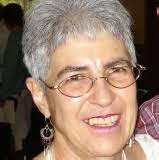[8-minute read]
We’ve missed her, but we carry on. This past March, her friends marked a first anniversary, grieved with her husband and family and, oh yes, be very sure of this, a sweet ripe bunch of them felt grateful for her life as they read and reflected on another fine book they’d likely never have heard of without her. And then they did it again in April.
I write here in remembrance of Phyllis Perrakis, a woman I knew only a little, though I felt lucky all the same. It is also a brief history of a book club, full of women, of course, plus one token oddball. (That would be Yours Truly.) I will also offer notes on the BIHE, an educational institution based on courage, justice and belief, but these seeming sidetracks all lead us back to Phyllis, a quiet, unassuming professor of literature. You would not have found her Very Professorial, if that adjective strikes notes for you of bombast or intellectual arrogance, but she surely glowed when she was sharing thoughts about a book she loved. BOOKS. Only now, far too late to learn more from her, do I find out that she was an internationally recognized scholar on the work of the Nobel Prize-winner for literature, Doris Lessing. But to better understand how we came to be Reading With Phyllis In Ottawa, first we need a side trip to Iran…
Once upon an early 21st century time, there was a book. It was written by Azar Nafisi, an Iranian professor of literature who had fallen exquisitely in love with American writers: Twain, Baldwin, McCullers, and the Russian-born Nabokov. It may not surprise you that Nafisi’s prospects for professional advancement in her homeland, after its Islamic Revolution, were bleak, and she has since moved to the United States. But before she did that, she found a clandestine way to share her literary enthusiasms with young women, the ones that she could never engage with publicly in studying “decadent” Western texts. Her book Reading Lolita in Tehran spoke of tense arrivals, a relieved doffing of the hijab upon entry into Nafisi’s home, but above all the rich delights of forbidden conversations among trusted friends about officially banned books, Lolita among them. Nafisi’s account was brilliant and popular and I highly recommend it, but that’s just the beginning.
My friend Elia is a Baha’i, and so she knows about persecution and repression in Iran, where the Baha’i community remains a harassed, scapegoated but shockingly resilient minority, 175 years after its birth there. When a friend wanted to learn more about the hows and whys of this longstanding abuse, Elia connected her with Phyllis, an English prof at the University of Ottawa with a fascinating undercover gig: Dr. Perrakis (we never called her that!) was an online instructor for the Baha’i Institute for Higher Education. BIHE has been a response to one of the latest methods of persecution by Iranian authorities: since the 1979 revolution, the Islamic Republic of Iran has sought to handicap, even extinguish, its largest religious minority, and access to education is one of its tools. Unless they publicly recant their faith, Baha’i students, no matter how accomplished, are not allowed to attend Iranian universities.
Azar Nafisi, and the journalist Maziar Bahari — the Jon Stewart-led drama Rosewater tells his story — are among the brave Iranians, most of whom live abroad, who have spoken out to protest this treatment. What the Baha’is of Iran have done, with characteristic quietness, confidence and inextinguishable resolve, was to start their own university in living rooms and virtual Internet lecture theatres. BIHE is an amazing story in itself, having had its graduates accepted and excelling in post-graduate programs around the world, among the first of which was UOttawa, Phyllis’s school. Maziar Bahari, a journalist who is not himself a Baha’i, created a film documentary called “To Light a Candle”, and an entire social justice movement whose motto is Education is Not a Crime. For many Baha’is who’ve spent years in jail for their work with the Baha’i Institute for Higher Education, it is certainly treated like one in the land of their birth, and Phyllis volunteered for this underground college.

The lovely Phyllis. (Photo from the Doris Lessing Society, of which she was President for several years, and one of its key organizers, editors and scholars.)
In brief: Elia and her friends advertised a public meeting in April of 2015, at which several BIHE grads who’d come to Ottawa spoke of their bumpy, even dangerous educational road, and Professor Perrakis offered insights into Reading Lolita in Tehran. The place was jammed, the evening was painful and splendid, and Elia had never been in a book club before. Conversations continued for several months. Sylvie, a writer and small publisher, gladly shared the title of her niche publishing idea, ‘Read the Spirit’, with Elia and Phyllis. Elia proposed a regular gathering that would encourage Ottawa Baha’is to discuss together their reading of various books of Baha’i history or biography; Phyllis eventually countered with a bigger idea. We read enough of those things. What about literature? How about a book club for novels that have some sort of spiritual underpinning to them? That would have a wider embrace. And Phyllis provided the mission statement, too: “Reading the Spirit Book Club focuses on novels that inspire and uplift while challenging the reader. Through group discussion we will deepen our understanding of our spiritual potential and the power of literature for personal growth.” Amen.
It is now over three years since the “Reading the Spirit Book Club” was launched. Phyllis was winding up her professional career, and was the torchbearer for this project for its first two years, while continuing to teach in the BIHE program. Sadly, the ravages of cancer and its treatment were working their dark magic on her, but her devotion to literature and learning never dimmed as she carried out the last teaching efforts of her life. The Spirit Team meets in the Ottawa Baha’i Centre once a month, summers excepted. (Many of its members, though, are not Baha’i.) January 2016, was a revelation for me, in several aspects. I was naïve enough to be surprised at being the only guy in the room; for another unsettling thing, I had never *heard* of Marilynne Robinson before starting to hunt for her second novel, Gilead, to prepare for that first RTS meeting. Gilead stunned me – I was raised as a Baptist Sunday School attendance champion in a small southern Ontario town, a place of corn and cornier jokes and a deep conservatism, and here was Robinson spinning compelling fiction about an aged pastor in just such a place in Iowa, which in my imagination is even flatter than Haldimand County. I was a huge fan, instantly, as not all of my club-mates were, but everyone admired the novel. Phyllis and more than a few others made comments and asked questions that reminded me that not all of the good ideas bubble from the swamp of my own humid brain. I wish Phyllis had spoken up more, but she refused to dominate and listened beautifully.
I couldn’t always attend the Smells Like Team Spirit sessions.¹ But I made sure to join in for the Marilynne Robinson reprises, as the two astounding follow-ups of the Gilead trilogy – Lila and Home, which tell largely the same stories but from vividly different perspectives – also made the club’s list within a few months of its start. Another American, Louise Erdrich (Four Souls, LaRose, The Last Report on the Miracle at Little No Horse) has also been read thrice, while two-time winners include the Turkish novelist Elif Shafak (The Forty Rules of Love, Honor), the Indo-Canadian Rohinton Mistry (Such a Long Journey, A Fine Balance), the Japanese-born British writer Kazuo Ishiguro (Never Let Me Go and The Buried Giant) and the British-born writer Bahiyyih Nakhjavani, whose fiction is inspired by dramatic events from Baha’i history (The Saddlebag, The Woman Who Read Too Much). I’d read Erdrich’s Little No Horse years ago, but was delighted to be gently compelled – ah, the power of deadlines! I need more of them! – to read these other authors, most of whom had been on my SHOULD list for some time.
¹A virtual prize to anyone recognizing that grungy, off-the-wall allusion in a story about a book club.
The ‘Reading the Spirit’ club departed from its usual format on Tuesday, February 20, 2018. It was Phyllis’s last meeting, and she had requested that the meeting be in her home, as this was the only way she could have attended. The group discussed its reading of Canadian Mary Lawson’s second novel, The Other Side of the Bridge, and how I wish I had been there — and not only because I still haven’t read Lawson. Phyllis made her own crossing to the other side less than three weeks later, March 10th, 2018.
But there’s no doubt about it: we’re still Reading With Phyllis In Ottawa. She continues to be a guide and touchstone for the RTS group. In May, the collective carries on with its reading of soulful, challenging literature, and I need to get my copy of Canadian poet and novelist Anne Michaels’s The Winter Vault. I read her Fugitive Pieces, deep and delicious, too long ago now to remember much about it, but an afternoon with the Spirited Ladies – and rest in peace and poetry, Phyllis! – and The Winter Vault will be a spring treasure.


Loved this post Jay. Thank you.